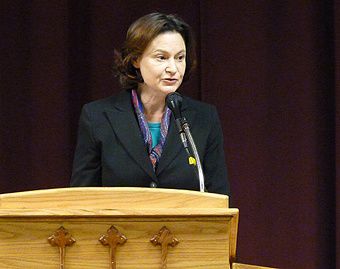Faced with a destructive “new intolerance,” the greatest Christian witnesses could be the very victims of the sexual revolution that created that intolerance, Catholic author Mary Eberstadt predicted.
Of all the witnesses who can illustrate the harm of the “new intolerance,” Eberstadt said in a Nov 11 lecture sponsored by the publication First Things, “the most empowering of all may be the ones most hidden to us.”
“These are the former victims of the sexual revolution itself. The walking wounded coming in and out of Pope Francis’s proverbial field hospitals.”
Eberstadt is a senior fellow at the Ethics and Public Policy Center in Washington, D.C., and author of the book “How the West Really Lost God.” Her lecture discussed “The New Intolerance,” which she described as a campaign by supporters of the sexual revolution to silence and intimidate those who speak out against its rotten fruits.
Such persecution has many ugly heads, she said, including slander against those preaching Christian sexual ethics, the HHS birth control mandate that threatens religious institutions, and the marginalization of academics and public figures who speak out against sexual misconduct.
This “New Intolerance,” born from the sexual revolution, uses “intimidation, humiliation, censorship and self-censorship to punish people who think differently,” she insisted.
In the face of this intimidating foe, however, some victims of the sexual revolution are not withdrawing into marginalization but are building a new order with mercy, Eberstadt said. She compared these people to the Christians who constructed the magnificent cathedral of Chartres on the ashes of their beloved basilica destroyed by fire.
“Those people and their leaders persevered and determined not to have their minds disfigured once and for all by a disaster,” Eberstadt said of the citizens of Chartres. The cathedral, one of the most famous in Europe for its Gothic architecture, was “built by men and women who had witnessed the signature disaster of their times and refused to resign themselves to it.”
In much the same way, victims of the sexual revolution are rebuilding Christianity with mercy, she explained, citing examples like author Eve Tushnet, a Catholic author who has written about her struggle with same-sex attraction and the vocation to love for all.
Victims such as Tushnet are helping other victims live the Christian vocation to love rather than give into to the demands of the sexual revolution, Eberstadt said.
“Christianity is being built more and more by these very witnesses themselves. By people who have come to embrace the difficult and long-standing Christian rulebook not because they know nothing of the revolution and its fallout, but because they know all too much,” she explained.
“And they are doing it with the same tool,” she added, that Pope Francis is emphasizing, namely, “mercy.”
Mercy for Pope Francis means “meeting people where they live,” Eberstadt explained, and this means finding those opponents of the sexual revolution who have been ostracized and marginalized in society for speaking out against it.
Not just Christians are persecuted here, she emphasized.
“It’s an 'everybody' problem,” she said, adding that a “civilized people do not just stand by and hit the 'like' button” while those around them suffer slander and criticism.
“Free speech isn’t just a religious word. Any attempt to make it one needs to be called out,” she stated.

